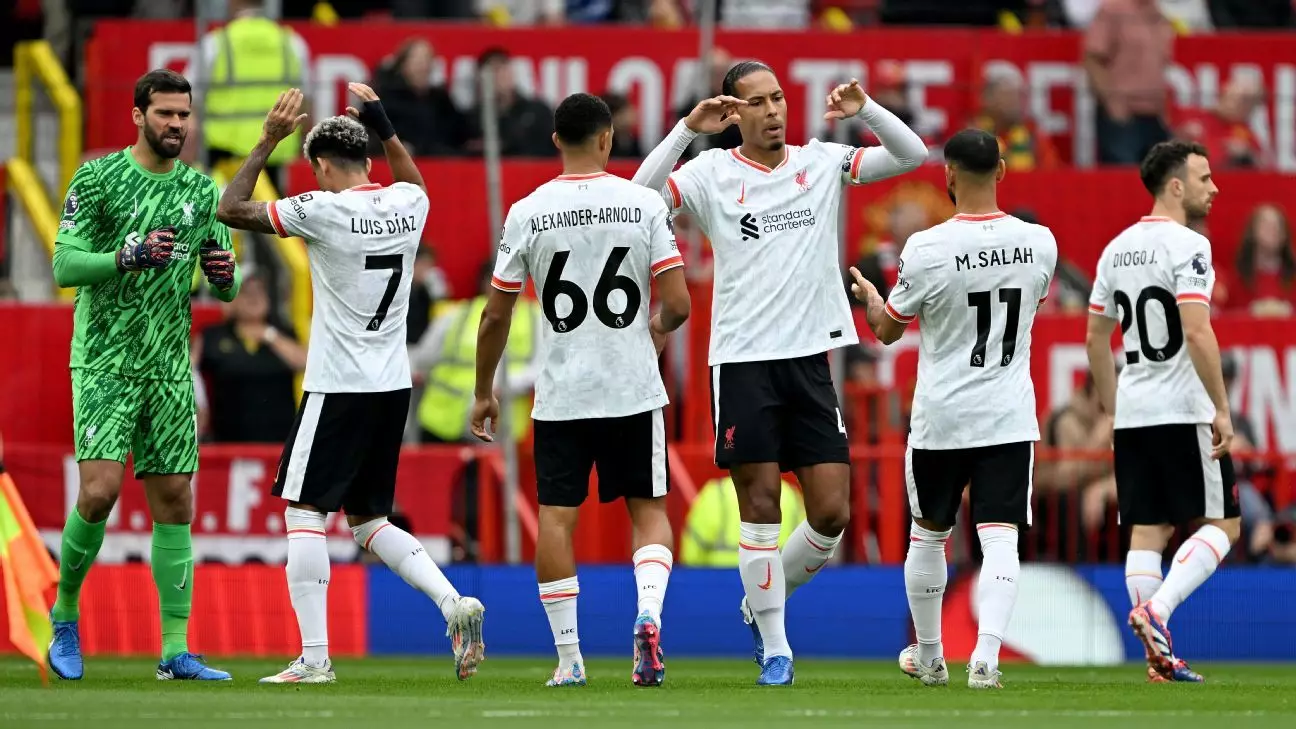As the clock ticks relentlessly toward the end of the 2023 season, Liverpool FC finds itself navigating a precarious contractual landscape that could see the departure of three pivotal players: Mohamed Salah, Virgil van Dijk, and Trent Alexander-Arnold. Each of these athletes brings unique strengths and a rich history to the club, yet their current contracts are set to expire, leading to an atmosphere punctuated by uncertainty and anxiety among fans and stakeholders alike. With less than 100 days until the transfer window opens, the potential loss of these icons threatens not only the team’s performance but also its identity.
Both Salah and Van Dijk bring podium-worthy levels of skill, experience, and leadership to an Anfield team that has historically relied upon such attributes. Their age, however, complicates contract negotiations; at 32 and 33 years respectively, questions loom around their longevity in a demanding sport. Can Liverpool afford to commit to long-term contracts for aging talents who may soon decline? FSG (Fenway Sports Group), the club’s ownership, faces a daunting dilemma, particularly after prior experiences with now-departed stars like Sadio Mané and Roberto Firmino, both of whom were offloaded before potential decline set in.
Conversely, Trent Alexander-Arnold, at the age of 25, is arguably in the prime of his career, suggesting a different set of negotiations. The club now stands at a crossroads, as extending a lucrative contract for Alexander-Arnold could incite similar demands from Salah and Van Dijk, escalating the already tense negotiations.
In the face of this multifaceted predicament, the absence of communication from the Liverpool boardroom is puzzling and somewhat alarming. The lack of updates on contract discussions has bred speculation, leading to a palpable tension among fans. When players voice their concerns, as Van Dijk did in August, it’s not merely a personal statement—it underscores a chicken-and-egg scenario: each player’s future is intricately linked. Until one contract is resolved, the next cannot proceed, creating a stalemate that sows confusion and disappointment.
Salah, after a stunning performance against Manchester United, expressed his frustrations, stating, “Nobody at the club has spoken to me yet about a new contract.” His words echo the sentiment of many supporters who feel that the club has dropped the ball in addressing these crucial negotiations. By waiting until the final moments of contracts, Liverpool risks losing players for nothing and betrays its tradition of holding onto loyal contributors who have significantly shaped its modern legacy.
This entire ordeal raises the question: has FSG miscalculated its approach? The financial ramifications of retaining aging players against the costs of potential replacements are ever-present, especially in a climate where no club can afford complacency. Liverpool has historically taken bold actions; sometimes proactively moving on from players before their value diminishes. The exodus of key figures such as Firmino, Mané, and Jordan Henderson signifies a preventative philosophy, yet the stakes are different with Salah and Van Dijk, who are regarded as club legends.
Liverpool’s failure to broker new contracts soon means they’ve relinquished control over powerful negotiating positions, increasing the likelihood of unfavorable outcomes. Should the club manage to sign long-term deals for Salah or Van Dijk, it may score a significant advantage, but until then, potential suitors are eagerly watching.
Meanwhile, while Alexander-Arnold’s contract affirms an unyielding potential for future stardom, his rising profile sparks anxiety regarding market interest from world-renown clubs like Real Madrid. His reluctance to outright dismiss a potential switch reveals both ambition and a prudential negotiating tactic. However, a balance must be struck between cashing in on his talents and securing his place within Liverpool’s grand design moving forward.
Alexander-Arnold’s own statements reflect a deeper narrative. “The most important thing is always trophies…that’s probably the main factor [in deciding my future],” he proclaimed. For a player of his caliber, performing with distinct clarity in the Champions League is imperative, yet the looming uncertainty raises the stakes for someone as dedicated to club success as he is.
As Liverpool navigates through this strategic conundrum, the pressure intensifies. Should all three players resolve their futures beneficially, it would mark a significant win for the club; however, the sideline murmurs of discontent ultimately cast shadows of potential failure. If negotiations continue to stagnate, the prospect of these players walking away as free agents looms larger with every passing day. As the dawn of the January transfer window approaches, Liverpool is not merely at a crossroads of contracts—they are at a pivotal moment that could redefine the club’s future trajectory. Time is in short supply, and the impending decisions will shape Liverpool FC for years to come.


Leave a Reply